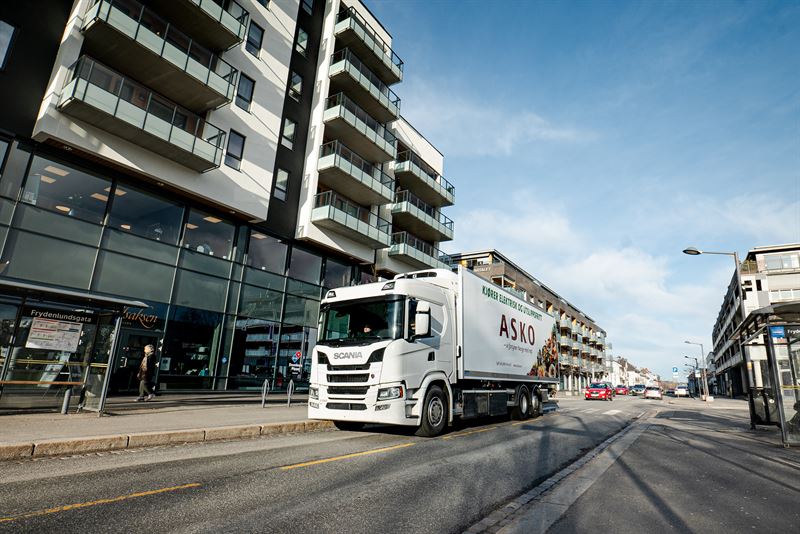Scania deploys battery electric trucks in Norway

Norwegian wholesaler ASKO is deploying two battery electric Scania distribution trucks in its operations in Oslo, Norway. This pilot marks another milestone in the cooperation regarding electrified solutions for heavy transport between Scania and ASKO.
The results from Scania’s hybrid vehicles using electric mode in city centres are positive, so it makes sense to start with fully electric battery-powered trucks in city distribution. With the battery technology that is currently available, battery electric trucks need to drive shorter distances and be able to recharge batteries. In city distribution, this can be done while loading or unloading goods. The two trucks that will go into ASKO’s operations have a battery capacity of 165 kWh, giving them a range of 120 km, and are charged by 130 kW cable charging.
“In the long run, electrification will be key to achieving a sustainable transport system for heavy vehicles as well. On the journey, it is as important as ever to work with customer-near development to understand the impact on the customers’ full operations, not only making sure that a technical solution works and the electricity that charges the batteries is sourced from renewable energy. That is why we are pleased with yet another important project together with ASKO,” says Karin Rådström, Head of Sales and Marketing at Scania.
Scania is continuing to invest in and develop electrified solutions and it will not be very long until we reach a tipping point where electrification for heavy transport will become a sound stand-alone investment for our customers. However, we are not quite there yet. This project received financial backing from Enova, which is a state enterprise owned by the Ministry of Climate and Environment in Norway.
“Scania has taken an active part in the development of batteries and battery cells, in our own research, through partnerships and with customers. It is an area where we expect significant progress in the next few years, including improvements that will cater for varying transport assignments while keeping the total cost of ownership for our customers in mind,” says Rådström.
As always, Scania’s work is based on a modular approach. In the battery electric trucks deployed in ASKO’s operations, the internal combustion engine in the powertrain is replaced by an electric machine, powered by rechargeable batteries.
Scania’s approach to electrification involves researching and developing a broad palette of solutions. This includes different kinds of bio-fuelled hybrid-electric technologies, as well as fully electric trucks and buses. Scania also works with electric vehicles that can be charged in different ways, ranging from plug-in charging, to pantograph-charging standing still or on the move through electrified roads, or charging through hydrogen-powered fuel cells.
FACTS ABOUT THE TRUCK:
- Gross Vehicle Weight: 27 tonnes
- Configuration: 6x2*4
- Powertrain: 290 kW electric machine/245 kW continuous output, 2-speed transmission, 2200 Nm peak torque
- Energy storage: 165 kWh Li-ion batteries
- Charging: Max power 150 kW DC (CCS)
- Range: 120 km
- Electric PTO: 15 kW
Read about electrification at Scania: www.scania.com/electrification
For further information, please contact:
Karin Hallstan, Head of Corporate Communication & PR
Phone: +46 76 842 81 04
E-mail: karin.hallstan@scania.com
Jonas Nordh, Director Sustainable Transport
Phone: +46855353591
E-mail: jonas_x.nordh@scania.com
Scania is a world-leading provider of transport solutions. Together with our partners and customers we are driving the shift towards a sustainable transport system. In 2018, we delivered 88,000 trucks, 8,500 buses as well as 12,800 industrial and marine engines to our customers. Net sales totalled to over SEK 137 billion, of which about 20 percent were services-related. Founded in 1891, Scania now operates in more than 100 countries and employs some 52,000 people. Research and development are concentrated in Sweden, with branches in Brazil and India. Production takes place in Europe, Latin America and Asia, with regional production centres in Africa, Asia and Eurasia. Scania is part of TRATON SE. For more information visit: www.scania.com.


